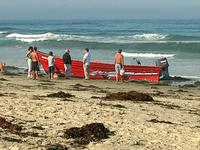-
Report: Israel "planning strike on Hezbollah sites in Syria"
Kuwaiti daily quotes unnamed Western sources to say that Israel has bolstered its military presence in the Golan and stepped up UAV, balloon overflights, in preparation for an attack on Hezbollah’s weapons storage facilities in Syria; since the 2006 war with Israel, Hezbollah has been storing its more valuable rockets and missiles in facilities in Syria, figuring that Israel would think long and hard before attacking military storage facilities in Syria, even if these facilities are used to store Hezbollah’s armaments; if an Israeli attack takes place, it should be seen as part of the preparations for an Israeli attack on Iran’s nuclear weapons facilities: in case of such an attack, Hezbollah would be instructed by Iran to launch the organization’s weapons against Israel, so Israel has an interest in weakening the organization’s military capabilities
-
-
Shape-shifting UAV for maritime search and rescue missions
Use of morphing flight surfaces has enabled the development of a shape-shifting UAV that can operate in extreme weather conditions; cutting-edge avionics ensure a smooth flight for extended rescue and surveillance missions, while reducing risks to material and crews
-
-
New illegal immigration frontier: the sea

There is a new frontier for illegal immigrants entering the United States — a roughly 400-square-mile ocean expanse that stretches from a bullring on the shores of Tijuana, Mexico, to suburban Los Angeles; in growing numbers, migrants are gambling their lives at sea as land crossings become even more arduous and likely to end in arrest; while only a small fraction of border arrests are at sea; authorities say heightened enforcement on land, and a bigger fence are making the offshore route more attractive
-
-
Money smuggling across border grows despite increased enforcement
U.S. and Mexican law enforcement authorities only seize about 1 percent of cash from drug trafficking, despite increased efforts by both countries; stemming the flow of cash is vital to efforts by the United States and Mexico to take down drug cartels, as drug cartels depend on cash from wholesale drug sales to gangs in the United States
-
-
Unmanned copter to deliver supplies to troops in forward positions
The U.S. military will award Lockheed Martin a contract to build an unmanned helicopter which will deliver supplies to forward-positioned troops; in trials earlier this year, a prototype has shown that it can shift 3,000lb of cargo across 150 nautical miles in two flights within six hours — all without any input from ground operators other than specifying the destination and route
-
-
Unmanned helicopter enters restricted airspace after losing communication
An MQ-8 Fire Scout lost communication with its operators and flew into restricted airspace around Washington, D.C.; typically during a lost communications event, an autonomous vehicle is preprogrammed based on its last waypoint to conduct certain activities, take a holding pattern, and wait for operators to reconnect; the Pentagon says: “We found a software anomaly that allowed aircraft not to follow its preprogrammed flight procedures”
-
-
Mexico deploys Israeli UAVs in war on drug cartels

Since December 2006, nearly 30,000 Mexicans have been killed in that country’s increasingly vicious drug war; the relentless flow of guns from the United States into Mexico has significantly strengthened the drug cartels, allowing them not only to withstand the efforts by the Mexican authorities to impose law and order, but in many cases to take the operational initiative, making large swaths of the country ungovernable; the Mexican government, for its part, is bolstering its own capabilities: last year it has secretly purchased surveillance UAVs from Israel to perform monitoring tasks in border areas and near strategic installations in the country
-
-
Skeletal scans could be newest screening technique
The adult skeleton has 206 bones; size, shape, density, and joint structure make each skeleton slightly different; throw in an extra lumbar vertebrae or extra rib — which some people have — as well as previously broken bones, implants, screws, and other identifying characteristics, and the signatures become even more individual
-
-
Railroads do not let HAZMAT teams know what is on train

Lethal chemicals roll through the backyards of cities and towns without the knowledge of these towns; residents; railroads do not share information about the schedule and contents of HAZMAT cargo with these towns’ emergency services, so the services cannot prepare for catastrophe; if chlorine or ammonia were to escape from a punctured tanker — in an accident or derailment — it would form a toxic cloud; a compromised 90-ton rail car of chlorine could create a plume fifteen miles long by five miles wide; the U.S. railroad industry transported some 75,000 tank cars of toxic inhalants nationwide in 2009
-
-
Biggest mass graves linked to drug-related violence uncovered in Mexico
Seventy-two bodies found in a mass grave on a ranch in northern Mexico; in recent months an increasing number of mass graves have been discovered; in June, police recovered fifty-five bodies from an abandoned mine near Taxco, in Guerrerro state
-
-
Sector Report for Tuesday, 24 August 2010: Emergency / Police / Mil.
This report contains the following stories.
Plus 1 additional story.
-
-
Hagerstown PD disappears from analog scanners
Those wishing to listen in on Hagerstown Police Department calls will have to update their technology: the “patch” to the old 800 MHz frequency, which allowed simulcasting of calls on the old analog frequencies, was taken down last week
-
-
Testing rayguns
Technologies for using laser energy to destroy threats at a distance — these weapons known as directed energy weapons — have been in development for many years; before these weapons can be used in the field, the lasers must be tested and evaluated at test ranges, and the power and energy distribution of the high-energy laser beam must be accurately measured on a target board, with high spatial and temporal resolution
-
-
Tracking algorithms for multiple targets win Australia's prestigious Eureka Prize
A University of Western Australia team — including two borthers who are professors at the school — have won the Eureka Prizes, Australia’s “science Oscars,” for a tracking system that has revolutionized the surveillance and monitoring of potential threats in the vast air, sea, and land space of Australia — and of other countries
-
-
DARPA looking for VTOL UAV to plant covert spy devices
The Pentagon is looking for a VTOL (vertical take-off and landing) UAV/UASs - or V-Bat - which will autonomously plant such surveillance devices as remote cameras/bugs, communications relays, marker beacons, small battery powered ground-crawler, or inside-buildings flying robots
-
More headlines
The long view
Why Ukraine’s AI Drones Aren’t a Breakthrough Yet
Machine vision, a form of AI, allows drones to identify and strike targets autonomously. The drones can’t be jammed, and they don’t need continuous monitoring by operators. Despite early hopes, the technology has not yet become a game-changing feature of Ukraine’s battlefield drones. But its time will come.
